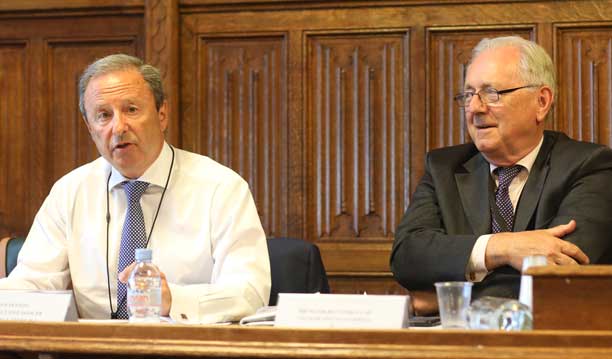
The APPG on July 11 considered insurance commissions, retirement housing event fees v ground rents, bogus ground rent review schemes linked to RPI, and leasehold insurance commissions. In spite of the rival attraction of the England v Croatia semi final it drew an audience of 70
By Sebastian OKelly, LKP trustee
The controversial issues of ground rents and exit fees in retirement housing were discussed at this week’s meeting of the All Party Parliamentary Group on leasehold and commonhold reform.
These were the main event in a meeting which also had an insider’s examination of leasehold insurance commissions, and why developers offering to swap doubling ground rents for ones related to RPI are just passing the onerous ground rent scandal on to successive generations.
The audience included a broad spectrum from the sector – lawyers, valuers, trade bodies, managing agents, tribunal judges, academics, Law Commission, civil service and MPs, as well as leaseholders.
Clive Fenton, the outgoing CEO of McCarthy and Stone, argued that ground rents averaging £466 were a justifiable charge given the communal spaces in its retirement sites.
These amounted to “generally around one third of the total floor space of these communities. It is up to about eight otherwise saleable apartments”.
Without ground rents, the flats’ cost would have to be £15,000 more, which would put them way beyond local market prices and more than buyers would be willing to pay.
Ground rents were “a small yearly sum”, said Mr Fenton. But in many cases they would be more than 0.1 per cent of the purchase price and therefore ineligible for mortgages from Nationwide, and other lenders. Of course, retirement housing is invariably bought by downsizers with cash.
“On our average developments of 40 apartments, the capitalisation of ground rents were about £600,000 on average, which is 30 times ground rent.
“In the absence of this income, the price that we can pay for the land drops by £600,000. That is roughly 20% of what we pay for the land on average.”

Clive Fenton, CEO of McCarthy and Stone, makes the case for ground rents in retirement housing, while an apparently unpersuaded Sir Peter Bottomley, co-chair of the APPG on leasehold reform, listens
There were numerous questions from the floor to Mr Fenton: one concerned the extraordinary creation of leases for house managers’ flats in 2009 which ended up belonging to Peverel / Firstport after the implosion of the Tchenguiz property empire. These have now been sold for £29 million.
It is an issue that Sir Peter Bottomley has raised in meetings with the Serious Fraud Office, the National Crime Agency and the City of London Police.
Mr Fenton said there was nothing he could at McCarthy and Stone sites where the freehold had been sold on and where the company had no involvement.
Michael Voges, executive director of the Association of Retirement Community Operators, which has declared that ground rents are unnecessary in retirement housing, argued in favour of deferred exit fees on re-sale.
These are typically 5 to 20 per cent, but can be as high as 30 per cent of the sale price in upmarket providers.
“Deferred fees are the primary way of paying for the care and housing needs of the elderly population in the US, New Zealand and Australia.
“Older people can be quite keen to pay these fees as long as they believe that the proposition is right for them.
“They allow the transfer of risk from the resident to the operator. The operator accepts a cap on the service charges and they take on all the risks for major repairs that happen in that period.”

Michael Voges, of retirement community trade body ARCO, illustrates his point. He does not believe ground rents are necessary in retirement housing, but makes his case for event fees – paid on re-sale of a property, which almost always means on death of the resident
They also align the interests of the resident and the operator in the long term well being of a retirement site, argued Mr Voges.
ARCO proved remarkably persuasive with the Law Commission in its report Event Fees in Retirement Properties, which was published last year.
LKP urged caution, while Sir Peter Bottomley and Jim Fitzpatrick, the APPG co-chairs, said the report was a “step backwards”.
Sir Peter told the meeting that those interested in event fees and ARCO should read the article on www.BetterRetirementHousing.com which included reports on the recent scandals surrounding them in Australia.
In contrast to Mr Fenton and Mr Voges, Joe Oldman of AgeUK said:
“We also support the basic principles of full transparency and that any fee or charge is linked to a specific service or benefit for the resident.
“We’re sympathetic to the retirement housing providers having a workable business model – but we would also like to see the end of ground rent because it doesn’t follow these basic principles.
The presentations provoked lively debate from the audience.

Rosemary Marshall, who lives in a Churchill Retirement Living site in Chichester, is indignant that she is paying £655pa in ground rent. ‘We are people of limited means,’ she told the APPG. Like so many retirement housing buyers, she bought her one-bedroom flat immediately after a crisis: the death of her husband. It is the urgent need of so many buyers which explains why purchases are not as considered as they might otherwise have been
Rosemary Marshal, 76, who lives in a Churchill Retirement Living site in Chichester, said:
“It is insulting for Churchill Retirement and McCarthy and Stone to call ground rents a small yearly sum. I pay £655pa ground rent for a small one-bedroom flat on the south coast.
“You are causing so much concern and worry to people who are vulnerable. We do not have unlimited means.”
Mrs Marshal also pointed out the often extreme vulnerability of the elderly when they make these purchases.
“When I moved in, I had just lost my husband. I had a massive physical and mental breakdown and it was a much as I could do to move in. I was really a poached egg on the mantelpiece.”

Joy Dickinson was one of several leaseholders present who is a member of the National Leasehold Campaign, which is demonstrating outside Westminster on July 18
Joy Dickinson, of the National Leasehold Campaign Facebook page, asked that as McCarthy and Stone ground rents were revised every 15 years in line with RPI, which is longer than most residents live in a retirement flat, was death the only way out of these contracts.
Michael Epstein, of the website About Peverel, asked whether Mr Fenton felt the ground rents paid for communal property such as the house managers’ flats in older McCarthy and Stone properties.
After the freeholds were sold to Vincent Tchenguiz, via his Tchenguiz Family Trust in the British Virgin Islands, new leases had been created on these properties in 2009.
Somehow as the Tchenguiz residential property empire unravelled they had ended up being owned by Peverel / Firstport, the property manager, and were recently sold for £29 million.
Mr Fenton said he could do nothing about these properties as the freeholds had been sold on.

Michael Epstein, of the website About Peverel, challenged the notion that ground rents paid for communal areas. House managers’ flats were communal until leases were issued in 2009 and somehow or other they ended up in the ownership of Peverel / FirstPort, which has sold them for £29 million
To which Mr Epstein responded:
“What happens if new owners and executives of McCarthy and Stone decide to sell the in-house management service currently in place and the problems arise again?
“£500 a year ground rent? I’m sorry that is just thought up by an accountant on how you can monetise elderly people,” said Mr Epstein.
“But what other choices do we have on how these spaces get paid for?” replied Mr Fenton.
Louie Burns, of Leasehold Solutions which deals with lease extensions and enfranchisement, said to Mr Fenton: “You talk about £500 a year ground rent as though this is a normal thing but, according to both RICS and Nationwide, they’re ridiculously onerous ground rents compared to the capital value of the property.
“It means elderly people are trapped.
“None of those properties are worth anything like what they should be because of the ground rent. You are effectively tricking elderly people into a system of ground rent the implications of which they would never have imagined.”

Louie Burns, a valuer who heads Leasehold Solutions, said none of McCarthy and Stone flats were worth what they should be because of onerous ground rents
Mr Fenton had earlier said that the ground rents did not account for the fall in value of flats built by McCarthy and Stone in the past.
Sir Peter Bottomley, who is also LKP patron, was late for the meeting as he was in discussion with James Brokenshire, the Communities and Housing Secretary.
“The point I made to him, which I hope industry representatives will agree with, is that the ministry of housing should never have a meeting with community retirement operators or with the developers without having LKP and leasehold representatives there at the same time.
“People say they want transparency. You get transparency by being in the same room at the same meeting, rather than some people pouring their ideas into the ears of officials or ministers and then we have to come along a month later, find out what was said and then say something different.
“Of course, you should be listening to Clive Fenton and the others, but you should also be asking why can’t we have that discussion together. And why can’t we have representatives of those who are already being screwed putting their voice forward and how we can retrospectively undo the damage that has been done to them in all these different ways?
“I think that the passion that many people in this room feel should be shared by the officials at DCLG.”
Sir Peter urged the taxpayer-funded Leasehold Advisory Service to be active in bringing leasehold injustices to ministers’ attention.
Sir Peter poured scorn on a capitalisation rate of ground rent at 30 times. “This is a function of very low interest rates at the moment.
“Secondly, when people sell homes they are selling them at market rates. Not selling them at lower rates because there is some other way of making money out of them, but at market price.”

Beth Rudolph, of the Conveyancing Association, has repeatedly warned of unacceptable high charges levied by landlords in leasehold property transactions. She told Michael Voges that consumer rights laws should protect buyers of retirement community properties and criminal prosecutions should follow if these laws are ignored
Beth Rudolph, of the Conveyancing Association, addressed Michael Voges and the ARCO code, which states the all financial information about a retirement property is made available prior to a prospective buyer viewing it.
“Mr Voges says that there is no regulation that requires this information to be revealed but there is.
“It is a scandal that it is not enforced: consumer protection from unfair trading regulations clearly says that any matter that would materially affect the purchaser’s decision should be advised to them prior to them viewing the property.
“It does not happen. When is the ministry going to provide sufficient resources for national trading standards to do this? This is a crime with criminal prosecution available and, as such, should be reported by conveyancers and, I should say, by community retirement operators.”
Mr Voges agreed: “What we’re saying is that there should be a process that is very clear that this is what you should be doing, and is not mandated right now.
“The Law Commission says you have to provide a worked example showing very clearly how the fees will work in 10 years time. This needs to be provided on the first visit to the property; it can’t be kind of slipped in at the last minute. All of those things we agree on, and quite frankly that’s what happens in other countries.
“The problem is that if you want to show that you’ve been mis-sold one of these retirement community products, first you have to go through a very complicated legal process because trading standards won’t do anything.”
Finally, Sebastian O’Kelly, LKP trustee, praised the achievements of Mr Fenton and expressed his sympathy that he was standing down as CEO at McCarthy and Stone on August 31.
“I would like to pay tribute to Clive Fenton. I’m sorry you’re standing down from McCarthy and Stone.
“You have made considerable improvements to that company: you’ve taken management in-house; you’ve extended the leases from 125 to 999 years and you have made some significant reforms.
“There are few things that we are going to disagree on, such as you saying that you sell freeholds to blameless pension funds. But we don’t know who’s buying some of them.
“When Adriatic Land, based in Guernsey, buys them we have not a clue, frankly. They hide their beneficial ownership behind nominee directors and they do it offshore, and that doesn’t smell good to me and it is not something we want in the retirement housing sector.
“But I do want to acknowledge the reforms that you have made and to thank you very much for speaking to us today.”
























Is the 1% charge by McCarthy & Stone an Event Fee?
From McCarthy & Stone
A Guide to Your New Home
Section 5 Page 20
YOUR SERVICE CHARGES
CONTINGENCY FUND
No matter how well the services are run, major items of expenditure do from time to time. A fund has been set up, financed in whole or in part by a 1% charge on the gross sale or open market value of a flat when it is resold or sub-let to meet such major items of repair or replacement. This is designed to avoid the additional and unexpected financial burden that such exceptional costs can otherwise involve.
The contingency fund will also be used to save for a maintenance plan, using the provision for general repairs within the annual service charge.
Does this apply to the 275/277 House Managers Flats recently sold by Firstport Retirement Ltd?